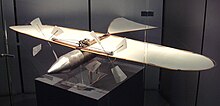

A pneumatic motor (air motor), or compressed-air engine, is a type of motor which does mechanical work by expanding compressed air. Pneumatic motors generally convert the compressed-air energy to mechanical work through either linear or rotary motion. Linear motion can come from either a diaphragm or piston actuator, while rotary motion is supplied by either a vane type air motor, piston air motor, air turbine or gear type motor.
Pneumatic motors have existed in many forms over the past two centuries, ranging in size from hand-held motors to engines of up to several hundred horsepower. Some types rely on pistons and cylinders; others on slotted rotors with vanes (vane motors) and others use turbines. Many compressed-air engines improve their performance by heating the incoming air or the engine itself. Pneumatic motors have found widespread success in the hand-held tool industry,[1] but are also used stationary in a wide range of industrial applications. Continual attempts are being made to expand their use to the transportation industry. However, pneumatic motors must overcome inefficiencies before being seen as a viable option in the transportation industry.
- ^ "Motors and Motor Control, Pneumatic motors - All industrial manufacturers in this category - Videos". Archived from the original on 2011-01-29.